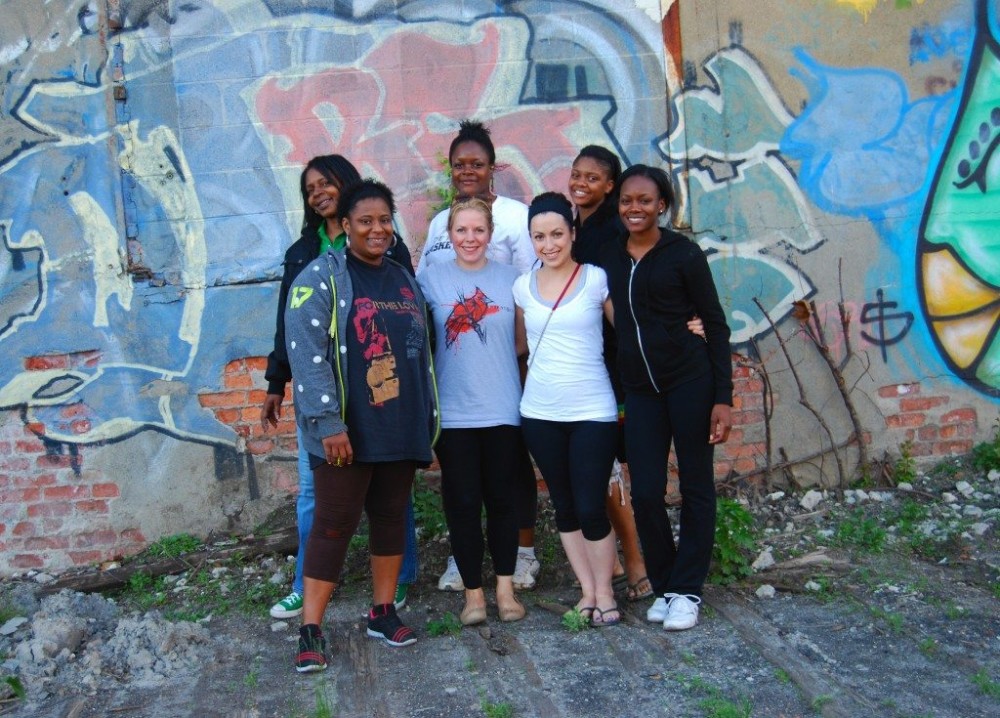By Robin Erb
Detroit Free Press.
What they’re selling at Detroit’s Rebel Nell — in whorls and loops of brilliant color buffed to a shine and hooked onto delicate silver chains — are acts of defiance.
It is art from decay. The refusal to be defined by the wreckage that can surround us.
“You might think it’s trash, but then I’ll find prizes, a treasure on the inside,” said 36-year-old Patricia, who asked that her last name not be used.
The “trash” is sheets of Detroit’s graffiti — most of it so heavily layered that it has peeled and fallen from crumbling facades.
Scavenged from alleyways and weedy lots, these nondescript sheets of paint are brought to this third-floor workshop in Detroit’s Grand River Creative Corridor, a mash-mash of color and graffiti and an incubator for Detroit artists.
Using heaters and cutters and polishing devices, the women tease out from these sometimes grimy sheets of graffiti a shocking kaleidoscope of color.
It’s a process that underscores an informal mission statement here: Never judge by outer layers.
Sometimes the most electrifying sheet of graffiti, when subjected to scrutiny back in the shop, holds little more than bland colors on the inside. Nothing really, said attorney and Rebel Nell cofounderAmy Peterson.
But other times?
“Look at this piece,” she said, slipping a thick sheet of paint layers from others. The surface is nondescript, but the rough edges expose a startling stratum of greens and blues and orange.
“There must be a hundred layers here,” she says. “That’s where the magic is.”
Rebel Nell took shape over time as Peterson walked Elbie, an English-French bulldog mix. She often stopped to talk with residents of a homeless shelter near her home.
From the women, the stories were often the same: “A lot were coming from difficult relationships or situations,” she said.
It took incredible courage to leave those circumstances, and it very often meant losing their jobs, too, she said.
At the same time, Peterson was thinking about all those sheets and slivers of graffiti underfoot. She knew something about jewelry: She’d made it to help pay her way through law school. She began roughing out an idea.
“I’m very passionate about empowering women,” said Peterson, a former New Yorker. Just as strongly, she wanted to give back to Detroit, “the place that gave me a shot at my dream.”
The key would be to make the business self-sustaining, Peterson said.
She and Diana Russell, a friend and a retail manager, spent months sorting through graffiti chips and prototyping jewelry.
They chose the name Rebel Nell. It’s an homage to Eleanor Roosevelt, who affectionately was called “Nell” by her father and who broke out of the roles expected of her.
The gritty moniker was to be stamped onto the thin silver backing of each piece.
It was Dec. 6 and below freezing outside this cement block building when Peterson and Russell and women hired through the Coalition for Temporary Shelter or C.O.T.S. arrived for their first shift.
They had hauled jewelry-making equipment up three flights of clanging metal stairs and taken furniture from their own homes, too.
They remain bundled in winter coats, each breath frosting the air in front of them as they worked.
“Amy was talking about, ‘One day we’ll do this and one day we’ll do that.’ And I was just thinking about getting through the day,” Patricia said, chuckling.
The goal, though, was long term: “jewelry with a purpose,” according to Rebel Nell’s website.
Peterson said it’s a chance to “enhance and empower and educate.”
Within days, each of the women established their own bank account and held an impromptu office party to celebrate their first debit cards.
“You know, it’s something that a lot of us just take for granted — a bank account,” Peterson said.
And as pieces of jewelry began taking on more creative shapes, the women also learned about marketing strategies, supply chains and other intricacies of business.
They began working just eight hours a week, but demand for the jewelry grew enough in the first six months that the women work 35 hours now.
Patricia and coworkers Karen and Mykira remain guarded about their pasts.
They use words and phrases such as “disadvantaged” and “drifting” and “fell into a situation.”
Peterson said using their last names could endanger their safety.
Like the jewelry they are selling, what matters is the end product.
Patricia runs her fingers over a slim gray and orange pendant dangling from a chain.
It was a piece her coworkers discarded — not worth the effort with so many other pieces of peeled graffiti awaiting. It now glints in the light, a dramatic splash of turquoise and violet and orange.
Peterson is sitting nearby, shaking her head. After just six months, “they make the jewelry better than I can,” she said. “It’s amazing.”
Patricia shrugs. She is studying the piece, tipping it at different angles: “I don’t like throwing things away. I like to give it a shiny life again.”














































































































































































































































































































































































